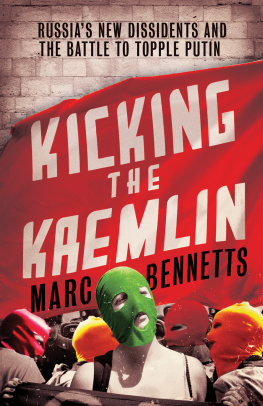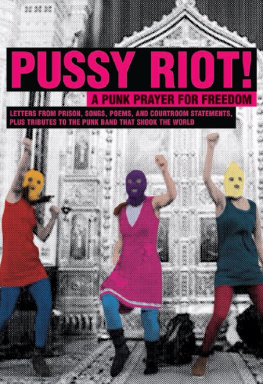Masha Gessen
WORDS WILL BREAK CEMENT
The Passion of Pussy Riot

GERA WANTED TO PEE. Again. In the eleven hours we had spent in the car the day before, she had alternated every five minutes between asking if we were there yet and demanding to be allowed to pee. She did not sleep a wink, even though we arrived at one in the morning. Now, barely eight hours later, we were back in my car, on our way to the penal colony, and Gera wanted to pee.
Gera, you cannot pee every five minutes! said Petya to his four-year-old daughter. You cannot appraise a work of art from the point of view of effectiveness. Now he was speaking into a lapel mic that belonged to the German television crew following us in another car. Before we left the hotel in Zubova Polyana where we had spent the night, I had to pull the car away from the back porch so the Germans could film the lanky Petya running to the car with huge plaid Chinese-made rectangular bags we were taking to the colony for Nadya, Petyas wife and Geras mother. This is the sixth time Ive been filmed loading bags into a car for Nadya. He laughed as he got into the passenger seat. He always seemed to enjoy the publicity connected with his wifes imprisonment, and only now, more than a year after I first met him, was I starting to appreciate how hard, tedious, and unceasing was the work he did on her behalf.
While one of the Germans was miking Petya up, another tried to interview Gera, but she went suddenly tight-lipped and petulant. When the reporter walked away, I tried, in a sudden fit of competitiveness, to ask Gera some questions too. We had, after all, become familiar to each other after spending a day in the car together.
When was the last time you saw your mom?
I dont remember anymore. She shrugged.
Why is your mom in jail?
I dont even know. She shrugged.
Who put her there?
She shrugged again. Putin.
Then her father and grandfather were finally in the car, and we started driving. And she wanted to pee. Again.
If you keep peeing in the cold, you will freeze your bottom and wont be able to have any children, said Andrei, the grandfather.
I dont need any children, Gera shot back.
I dont either, said Andrei. But you see, they just happen to you.
Andrei was not the kind of man you would want talking to your daughter. At fifty-six, he was well-worn, but you could tell he used to be movie-star handsome. He was impatient. He was occasionally inappropriate, as when he started berating Petya in front of Gera. He was immature. When a tired Gera threw a tantrum, demanding that she be taken to her mother, her grandmother, and back to the hotelimmediately, and all at the same timehe threw a tantrum too, demanding that Petya give him his cup of coffee, then giving it back, then taking it again. The rest of the time he talked and played with Gera, to her evident delight, but when I heard him teaching her to say the word entropiya (entropy), I found myself stifling the impulse to explain to him that children are not circus acts. I assumed such remonstrations had been attempted many times before by other women, to no evident effect.
Mama does not want to see you, Gera told Andrei now, kicking her foot against the floor. She had taken to calling her grandmother, Petyas mother, Mama. It drove Andrei crazy, and he made no effort hide it.
I dont want to see her either, he declared.
You scared of her? asked Gera.
Well, she is a woman, Andrei responded, with what I thought was uncharacteristic candor.
WE HAD SPENT THE NIGHT at a hotel on the third floor of the House of Homekeepinga peculiar name given, back in Soviet times, to buildings that contained services ranging from hair salons to shoe repair shops. In 2013, the House of Homekeeping in Zubova Polyana, Mordoviapopulation just over ten thousandcontained a half-dozen clean hotel rooms with simple pine furniture, a pool hall, a caf, and a reception desk for the hotel that also sold a mind-boggling assortment of hair dyes in the narrow color range from pink to copper, and two kinds of flags: a flag of the Russian Federation for the equivalent of ten dollars and one of Mordovia for about twelve. The caf in the House of Homekeeping was named 13, after the number featured on Mordovian license platesas distinct from the numbers associated with each of the other eighty-two regions that make up the Russian Federation. As in the Western tradition, thirteen is an unlucky number in Russia, the devils dozen, and it seemed an appropriate designation for the region with not only Russias but the worlds highest concentration of prison inmates among its residents.
We had about twenty-five miles to go to get to Nadyas penal colony, Correctional Colony Number 14, or IK-14. Petya pointed out local landmarks. Here was a rusting metal board with the words RESTRICTED TERRITORY. NO PASSING WITHOUT STOPPING, but there was no checkpoint at which to stopit had apparently been eliminated some years ago, when another high-profile female inmate was serving time here and someone high up decided the checkpoint looked bad on film. A mens maximum-security colony straddled both sides of the road; a covered bridge concealed by tin sheeting connected the structures, allowing inmates to be taken across the road out of sight of drivers. Another mens colony, a womens one, then a bland stretch of road with an identical flat forest on either side, then, finally, the village of Partsa, which consisted of IK-14, a small variety store, and a smattering of houses where IK-14 employees lived.
The penal colony hid behind a tall gray fence, with only a couple of structures reaching above it: a sizable churchOrthodox churches were erected in all the surrounding colonies in the 1990sand one of the colonys standard gray concrete buildings with a wall-size poster of a girl child on it. Petya told me the caption, obscured by the fence, said YOUR FAMILY IS WAITING FOR YOU. We entered a two-room structure for visitors. It had been freshly built, most likely because Nadya was expected to draw media attention here, and it even included a carpeted playroom with a crib, a set of toddler-appropriate Legos, and a rocking donkey. Gera and Andrei took off their shoes and started building a Lego prison from which a rubber duck was going to help her friend the princess escape by means of a plastic fire truck with a telescoping ladder.
Petya planted himself and the bags in the larger room. One of its walls was entirely taken up with bulletin boards. A small one labeled THE SOCIAL MOBILITY SYSTEM featured charts and flyers geared to show that malicious repeat offenders would come to no good in prison while positively characterized convicts have hope for the future. A large board labeled INFORMATION was completely covered with sample applications: an application to be granted a visit with an inmate; an application to have a package delivered to an inmate; excerpts from laws relevant to the business of visiting inmates; and descriptions of attempted violations colony authorities had successfully intercepted. In both of the cases described, visitors had tried to smuggle cell phones to inmates during a visit and had paid a high price, forfeiting not only the phones but visitation rights.
A lonely LED display hung on the back wall. On it, a corpulent middle-aged woman in a federal prisonauthority uniform was reading out rules and regulations and excerpts from the Penal Correctional Code. It was a twenty-minute recording playing on a loop, and by the time our wait was over, we had absorbed the rules in all their monotonous detail. Petya took off his parka and, wearing one of his apparently endless supply of checkered fitted Ralph Lauren shirts, sat down at a desk facing the window, with his back to the woman on the screen, and started making a complete list of the contents of the large plaid bags.

















